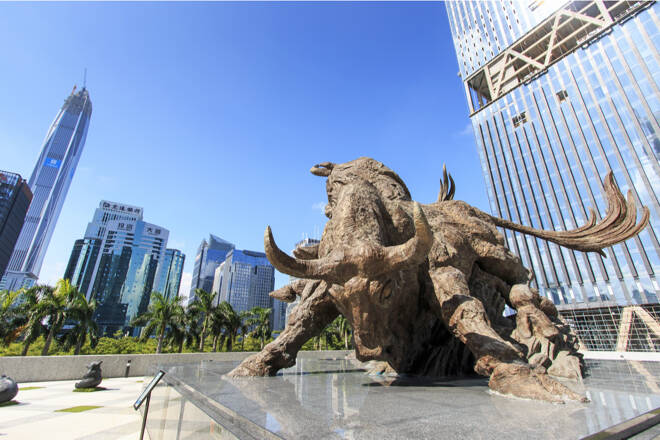Advertisement
Advertisement
Hang Seng Index, ASX 200, Nikkei 225: Futures Flash Green Despite US Data
By:
US economic indicators, including ADP employment and jobless claims, take center stage in shaping Asian market sentiment after a more hawkish FOMC stance.
Highlights
- The Hang Seng Index bucked the Asian market on Thursday, ending the session flat while the ASX 200 and Nikkei ended the day in negative territory.
- Investors reacted to the overnight FOMC Meeting Minutes, hawkish Fed chatter, and labor market data.
- On Friday, investors could remain cautious, with the US Jobs Report in focus.
Overview of the Thursday Session
On Thursday, the Nikkei led the ASX 200 and the Hang Seng Index into negative territory. However, the Hang Seng Index recovered losses in the afternoon session, ending the day flat. Overnight Fed commentary, US economic indicators, and the Fed Minutes from Wednesday impacted market risk sentiment.
Tight labor market conditions, hawkish Fed chatter, and a pickup in service sector activity weighed on the US equity markets. More hawkish-than-expected FOMC contributed to the losses.
On Wednesday, the Nasdaq Composite Index slid by 1.18%. The S&P 500 and the Dow ended the day down 0.80% and 0.76%, respectively.
Service sector PMI numbers failed to provide relief despite a better-than-expected China Caixin Services PMI.
US Labor Market Data to Set the Tone
On Friday, overnight US economic indicators from Thursday will influence the Asian session. ADP employment, jobless claims, and Services PMI numbers were in focus. After the more hawkish-than-expected Fed Minutes, the markets were more sensitive to the numbers.
According to the ADP Report, employment increased by 164k in December versus 101k in November. Initial jobless claims fell from 220k to 202k, another signal of a tight labor market. The S&P Global Services PMI increased from 50.8 to 51.4 in December, up from a preliminary 51.3.
The US equity markets reacted to the stats. On Thursday, the Nasdaq Composite Index and S&P 500 fell by 0.56% and 0.34%, respectively. The Dow gained 0.03%.
However, finalized Services PMI numbers from Japan, Bank of Japan commentary, and stimulus chatter from Beijing also need consideration.
In the futures markets, the ASX 200 and Nikkei were up 21 and 50 points, respectively.
ASX 200
The ASX 200 declined by 0.39% on Thursday. Oil stocks countered losses across the banks, gold, mining, and tech sectors. The S&P ASX All Technology Index (XTX) fell by a further 0.32%.
Oil stocks cushioned the downside: Woodside Energy Group Ltd (WDS) and Santos Ltd (STO) saw gains of 1.35% and 1.32%, respectively. However, Gold (XAU/USD) stocks saw losses: Evolution Mining Ltd. (EVN) and Northern Star Resources Ltd. (NST) slid by 2.32% and 2.81%, respectively.
Mining stocks had a mixed session, while the big four banks ended the Thursday session in negative territory.
Fortescue Metals Group Ltd. (FMG) gained 0.31%. BHP Group Ltd (BHP) and Rio Tinto Ltd. (RIO) fell by 0.38% and 0.16%, respectively.
Westpac Banking Corp. (WBC) slid by 1.01%, with ANZ Group Holdings Ltd (ANZ) declining by 0.78%. Commonwealth Bank of Australia (CBA) and National Australia Bank Ltd. (NAB) saw losses of 0.57% and 0.42%, respectively.
Hang Seng Index
The Hang Seng Index ended the session flat on Thursday. A more hawkish-than-expected Fed left the Index in negative territory before a late recovery. The Hang Seng Tech Index (HSTECH) gained 0.23%. Property stocks also steadied after a series of heavy losses. The Hang Seng Mainland Properties Index (HSMPI) rose by 0.12%.
Alibaba (9988) gained 1.02%, while Tencent (0700) declined by 0.60%.
Bank stocks had another mixed session. HSBC (0005) slid by 0.80%. However, China Construction Bank (0939) and Industrial Commercial Bank (1398) ended the day up 0.66% and 1.07%, respectively.
The Nikkei 225
(Graph for reference purposes only)
On Thursday, the Nikkei fell by 0.53% on the first day of trading in 2024.
Bank stocks had a positive start to 2024. Sumitomo Mitsui Financial Group Inc. (8316) and Mitsubishi UFJ Financial Group Inc. (8306) gained 1.45% and 1.11%, respectively. However, it was a mixed start to the year for the main components of the Nikkei.
Softbank Group Corp. (9948) and Tokyo Electron Ltd. (8035) slid by 3.86% and 4.95%, respectively. The tech sector sell-off left the pair with heavy losses.
Fast Retailing Co. Ltd. (9983) and Sony Group Corp. (6758) saw losses of 1.26% and 2.35%, respectively.
However, KDDI Corp. (9433) bucked the trend, gaining 1.36%.
For upcoming economic events, check out our economic calendar.
About the Author
Bob Masonauthor
With over 28 years of experience in the financial industry, Bob has worked with various global rating agencies and multinational banks. Currently he is covering currencies, commodities, alternative asset classes and global equities, focusing mostly on European and Asian markets.
Advertisement
